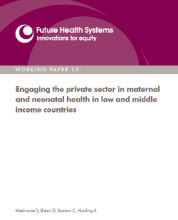Engaging the Private Sector in Maternal and Neonatal Health in Low and Middle Income Countries
This working paper discusses the need/importance of engaging the private sector. It also presents a review of evidence around strategies and modalities that are implemented in, by or through the private sector to improve maternal health outcomes. The strength of the evidence is evaluated and recommendations are made for logical entry points where donors and governments can encourage engagement by the private sector in maternal and neonatal health. Engaging the Private Sector in Maternal and Neonatal Health in Low and Middle Income Countries Year of Publication: 2010 Organization: Future Health Systems Length: 41 pages Languages: English

